Entrepreneurship and Small Business Management Report - P1-P7
VerifiedAdded on 2023/02/01
|13
|3912
|63
Report
AI Summary
This report provides a detailed analysis of entrepreneurship and small business management. It begins by defining entrepreneurship and exploring various types of entrepreneurial ventures, including small business, scalable start-up, large company, and social entrepreneurship, along with their typologies and differences. The report then delves into the impact of micro and small businesses on the UK economy, supported by relevant data and statistics, highlighting their contribution to revenue generation and job creation. Furthermore, it examines the role of small businesses and start-ups in fostering the growth of the social economy. The report also identifies and assesses the characteristic traits and skills of successful entrepreneurs, exploring how these aspects influence entrepreneurial motivation and mindset. Finally, it considers the potential negative impacts of background and experience on entrepreneurial performance, offering a comprehensive overview of the key factors influencing entrepreneurial success.

Entrepreneurship and Small
Business Management
Business Management
Paraphrase This Document
Need a fresh take? Get an instant paraphrase of this document with our AI Paraphraser

Contents
INTRODUCTION.................................................................................................................................3
TASK 1.................................................................................................................................................3
P1 Different types of entrepreneurial ventures and manner in which they relate to typology of
entrepreneurship...............................................................................................................................3
P2 Similarities and difference in between entrepreneurial ventures................................................5
TASK 2.................................................................................................................................................6
P3 Interpret relevant data and statistics to illustrate how micro and small business impact on the
economy............................................................................................................................................6
P4 Explain small business and business start ups to growth of the social economy..........................7
TASK 3.................................................................................................................................................8
P5 Characteristic traits and skills of successful entrepreneurs..........................................................8
P6 Assess how aspects of the entrepreneurial personality reflect entrepreneurial motivation and
mind set...........................................................................................................................................10
TASK 4...............................................................................................................................................10
P7 Different ways by which background and experience can hamper the performance of
entrepreneurship.............................................................................................................................10
CONCLUSION...................................................................................................................................11
REFERENCES....................................................................................................................................12
INTRODUCTION.................................................................................................................................3
TASK 1.................................................................................................................................................3
P1 Different types of entrepreneurial ventures and manner in which they relate to typology of
entrepreneurship...............................................................................................................................3
P2 Similarities and difference in between entrepreneurial ventures................................................5
TASK 2.................................................................................................................................................6
P3 Interpret relevant data and statistics to illustrate how micro and small business impact on the
economy............................................................................................................................................6
P4 Explain small business and business start ups to growth of the social economy..........................7
TASK 3.................................................................................................................................................8
P5 Characteristic traits and skills of successful entrepreneurs..........................................................8
P6 Assess how aspects of the entrepreneurial personality reflect entrepreneurial motivation and
mind set...........................................................................................................................................10
TASK 4...............................................................................................................................................10
P7 Different ways by which background and experience can hamper the performance of
entrepreneurship.............................................................................................................................10
CONCLUSION...................................................................................................................................11
REFERENCES....................................................................................................................................12
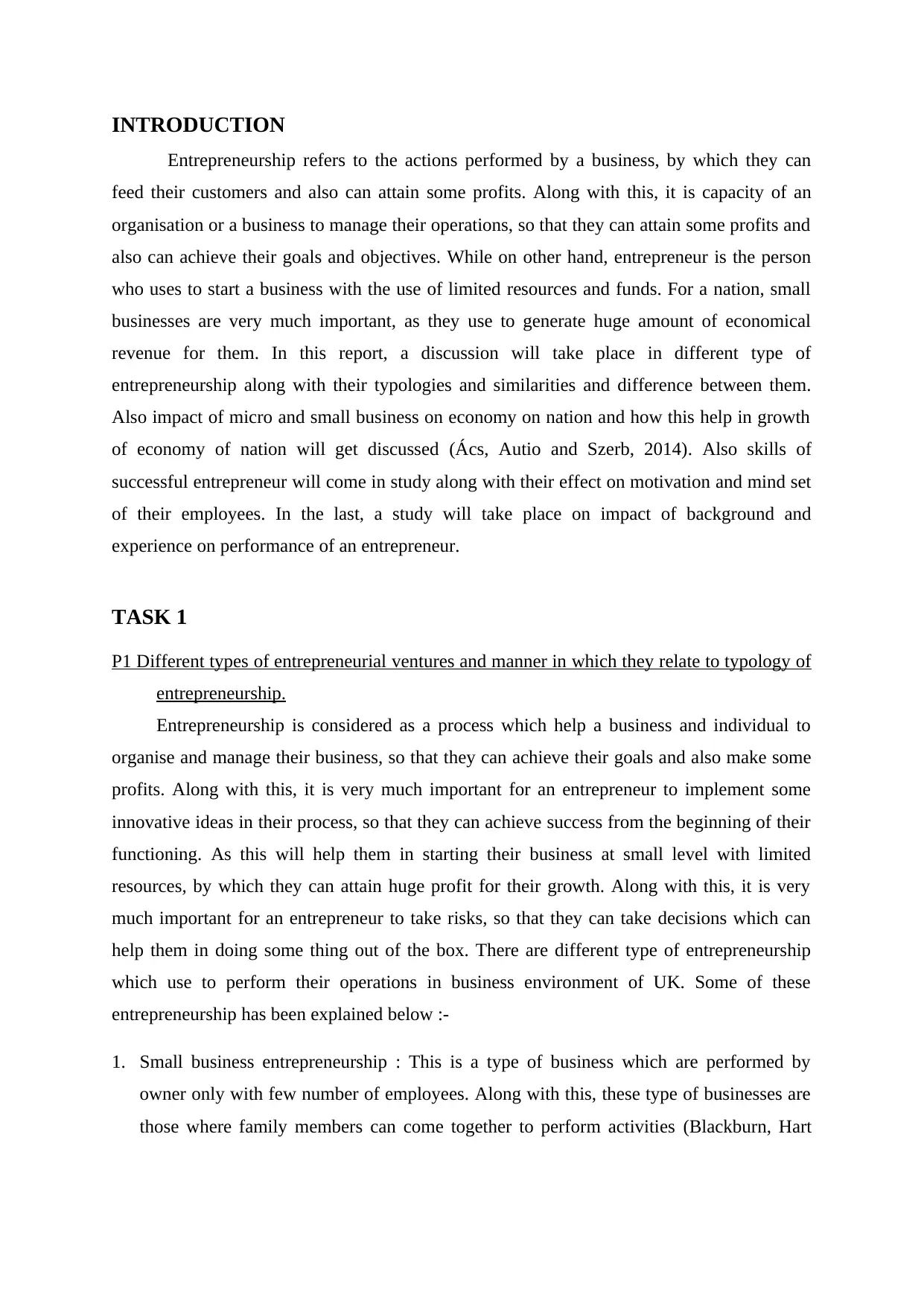
INTRODUCTION
Entrepreneurship refers to the actions performed by a business, by which they can
feed their customers and also can attain some profits. Along with this, it is capacity of an
organisation or a business to manage their operations, so that they can attain some profits and
also can achieve their goals and objectives. While on other hand, entrepreneur is the person
who uses to start a business with the use of limited resources and funds. For a nation, small
businesses are very much important, as they use to generate huge amount of economical
revenue for them. In this report, a discussion will take place in different type of
entrepreneurship along with their typologies and similarities and difference between them.
Also impact of micro and small business on economy on nation and how this help in growth
of economy of nation will get discussed (Ács, Autio and Szerb, 2014). Also skills of
successful entrepreneur will come in study along with their effect on motivation and mind set
of their employees. In the last, a study will take place on impact of background and
experience on performance of an entrepreneur.
TASK 1
P1 Different types of entrepreneurial ventures and manner in which they relate to typology of
entrepreneurship.
Entrepreneurship is considered as a process which help a business and individual to
organise and manage their business, so that they can achieve their goals and also make some
profits. Along with this, it is very much important for an entrepreneur to implement some
innovative ideas in their process, so that they can achieve success from the beginning of their
functioning. As this will help them in starting their business at small level with limited
resources, by which they can attain huge profit for their growth. Along with this, it is very
much important for an entrepreneur to take risks, so that they can take decisions which can
help them in doing some thing out of the box. There are different type of entrepreneurship
which use to perform their operations in business environment of UK. Some of these
entrepreneurship has been explained below :-
1. Small business entrepreneurship : This is a type of business which are performed by
owner only with few number of employees. Along with this, these type of businesses are
those where family members can come together to perform activities (Blackburn, Hart
Entrepreneurship refers to the actions performed by a business, by which they can
feed their customers and also can attain some profits. Along with this, it is capacity of an
organisation or a business to manage their operations, so that they can attain some profits and
also can achieve their goals and objectives. While on other hand, entrepreneur is the person
who uses to start a business with the use of limited resources and funds. For a nation, small
businesses are very much important, as they use to generate huge amount of economical
revenue for them. In this report, a discussion will take place in different type of
entrepreneurship along with their typologies and similarities and difference between them.
Also impact of micro and small business on economy on nation and how this help in growth
of economy of nation will get discussed (Ács, Autio and Szerb, 2014). Also skills of
successful entrepreneur will come in study along with their effect on motivation and mind set
of their employees. In the last, a study will take place on impact of background and
experience on performance of an entrepreneur.
TASK 1
P1 Different types of entrepreneurial ventures and manner in which they relate to typology of
entrepreneurship.
Entrepreneurship is considered as a process which help a business and individual to
organise and manage their business, so that they can achieve their goals and also make some
profits. Along with this, it is very much important for an entrepreneur to implement some
innovative ideas in their process, so that they can achieve success from the beginning of their
functioning. As this will help them in starting their business at small level with limited
resources, by which they can attain huge profit for their growth. Along with this, it is very
much important for an entrepreneur to take risks, so that they can take decisions which can
help them in doing some thing out of the box. There are different type of entrepreneurship
which use to perform their operations in business environment of UK. Some of these
entrepreneurship has been explained below :-
1. Small business entrepreneurship : This is a type of business which are performed by
owner only with few number of employees. Along with this, these type of businesses are
those where family members can come together to perform activities (Blackburn, Hart
⊘ This is a preview!⊘
Do you want full access?
Subscribe today to unlock all pages.

Trusted by 1+ million students worldwide
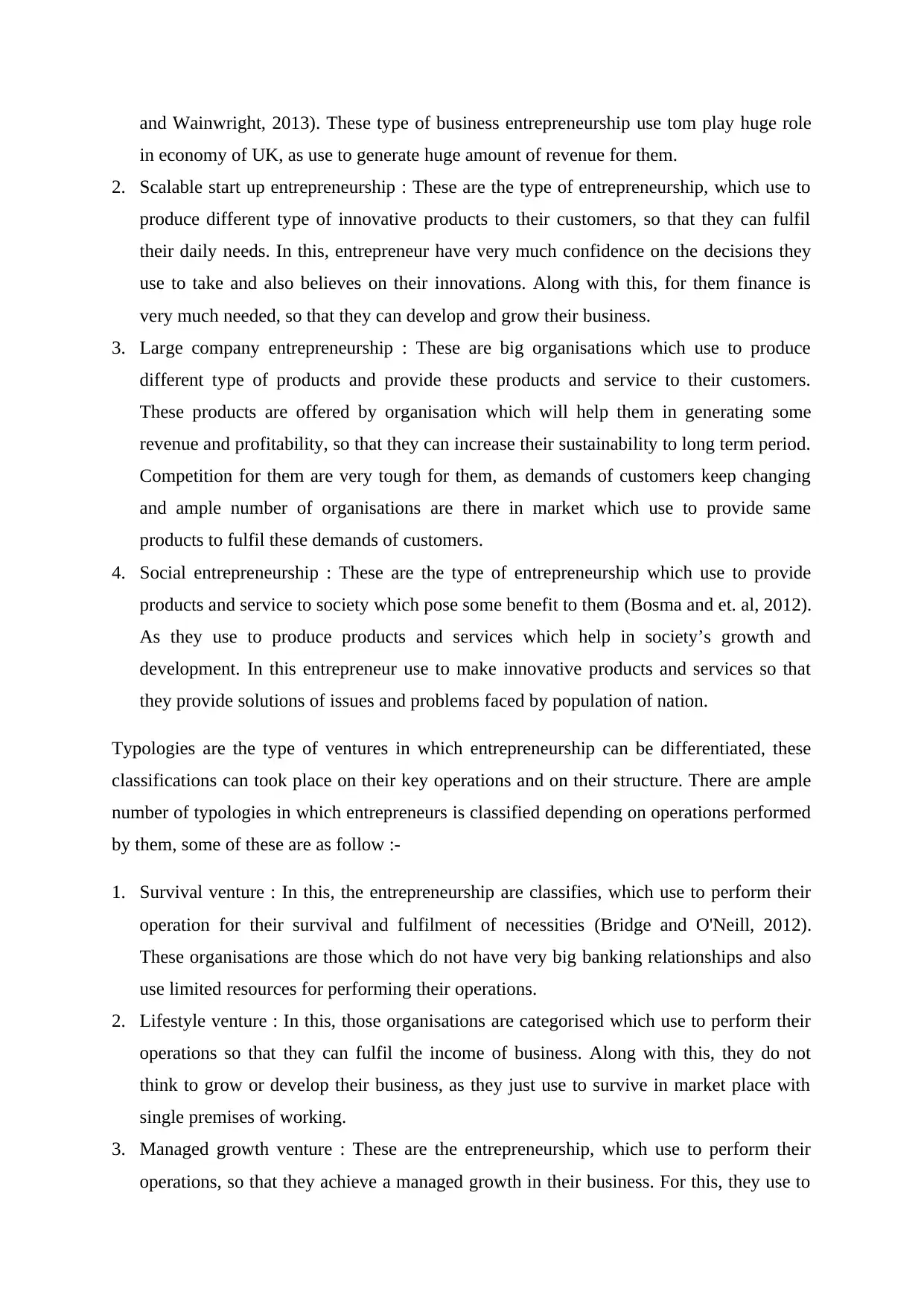
and Wainwright, 2013). These type of business entrepreneurship use tom play huge role
in economy of UK, as use to generate huge amount of revenue for them.
2. Scalable start up entrepreneurship : These are the type of entrepreneurship, which use to
produce different type of innovative products to their customers, so that they can fulfil
their daily needs. In this, entrepreneur have very much confidence on the decisions they
use to take and also believes on their innovations. Along with this, for them finance is
very much needed, so that they can develop and grow their business.
3. Large company entrepreneurship : These are big organisations which use to produce
different type of products and provide these products and service to their customers.
These products are offered by organisation which will help them in generating some
revenue and profitability, so that they can increase their sustainability to long term period.
Competition for them are very tough for them, as demands of customers keep changing
and ample number of organisations are there in market which use to provide same
products to fulfil these demands of customers.
4. Social entrepreneurship : These are the type of entrepreneurship which use to provide
products and service to society which pose some benefit to them (Bosma and et. al, 2012).
As they use to produce products and services which help in society’s growth and
development. In this entrepreneur use to make innovative products and services so that
they provide solutions of issues and problems faced by population of nation.
Typologies are the type of ventures in which entrepreneurship can be differentiated, these
classifications can took place on their key operations and on their structure. There are ample
number of typologies in which entrepreneurs is classified depending on operations performed
by them, some of these are as follow :-
1. Survival venture : In this, the entrepreneurship are classifies, which use to perform their
operation for their survival and fulfilment of necessities (Bridge and O'Neill, 2012).
These organisations are those which do not have very big banking relationships and also
use limited resources for performing their operations.
2. Lifestyle venture : In this, those organisations are categorised which use to perform their
operations so that they can fulfil the income of business. Along with this, they do not
think to grow or develop their business, as they just use to survive in market place with
single premises of working.
3. Managed growth venture : These are the entrepreneurship, which use to perform their
operations, so that they achieve a managed growth in their business. For this, they use to
in economy of UK, as use to generate huge amount of revenue for them.
2. Scalable start up entrepreneurship : These are the type of entrepreneurship, which use to
produce different type of innovative products to their customers, so that they can fulfil
their daily needs. In this, entrepreneur have very much confidence on the decisions they
use to take and also believes on their innovations. Along with this, for them finance is
very much needed, so that they can develop and grow their business.
3. Large company entrepreneurship : These are big organisations which use to produce
different type of products and provide these products and service to their customers.
These products are offered by organisation which will help them in generating some
revenue and profitability, so that they can increase their sustainability to long term period.
Competition for them are very tough for them, as demands of customers keep changing
and ample number of organisations are there in market which use to provide same
products to fulfil these demands of customers.
4. Social entrepreneurship : These are the type of entrepreneurship which use to provide
products and service to society which pose some benefit to them (Bosma and et. al, 2012).
As they use to produce products and services which help in society’s growth and
development. In this entrepreneur use to make innovative products and services so that
they provide solutions of issues and problems faced by population of nation.
Typologies are the type of ventures in which entrepreneurship can be differentiated, these
classifications can took place on their key operations and on their structure. There are ample
number of typologies in which entrepreneurs is classified depending on operations performed
by them, some of these are as follow :-
1. Survival venture : In this, the entrepreneurship are classifies, which use to perform their
operation for their survival and fulfilment of necessities (Bridge and O'Neill, 2012).
These organisations are those which do not have very big banking relationships and also
use limited resources for performing their operations.
2. Lifestyle venture : In this, those organisations are categorised which use to perform their
operations so that they can fulfil the income of business. Along with this, they do not
think to grow or develop their business, as they just use to survive in market place with
single premises of working.
3. Managed growth venture : These are the entrepreneurship, which use to perform their
operations, so that they achieve a managed growth in their business. For this, they use to
Paraphrase This Document
Need a fresh take? Get an instant paraphrase of this document with our AI Paraphraser
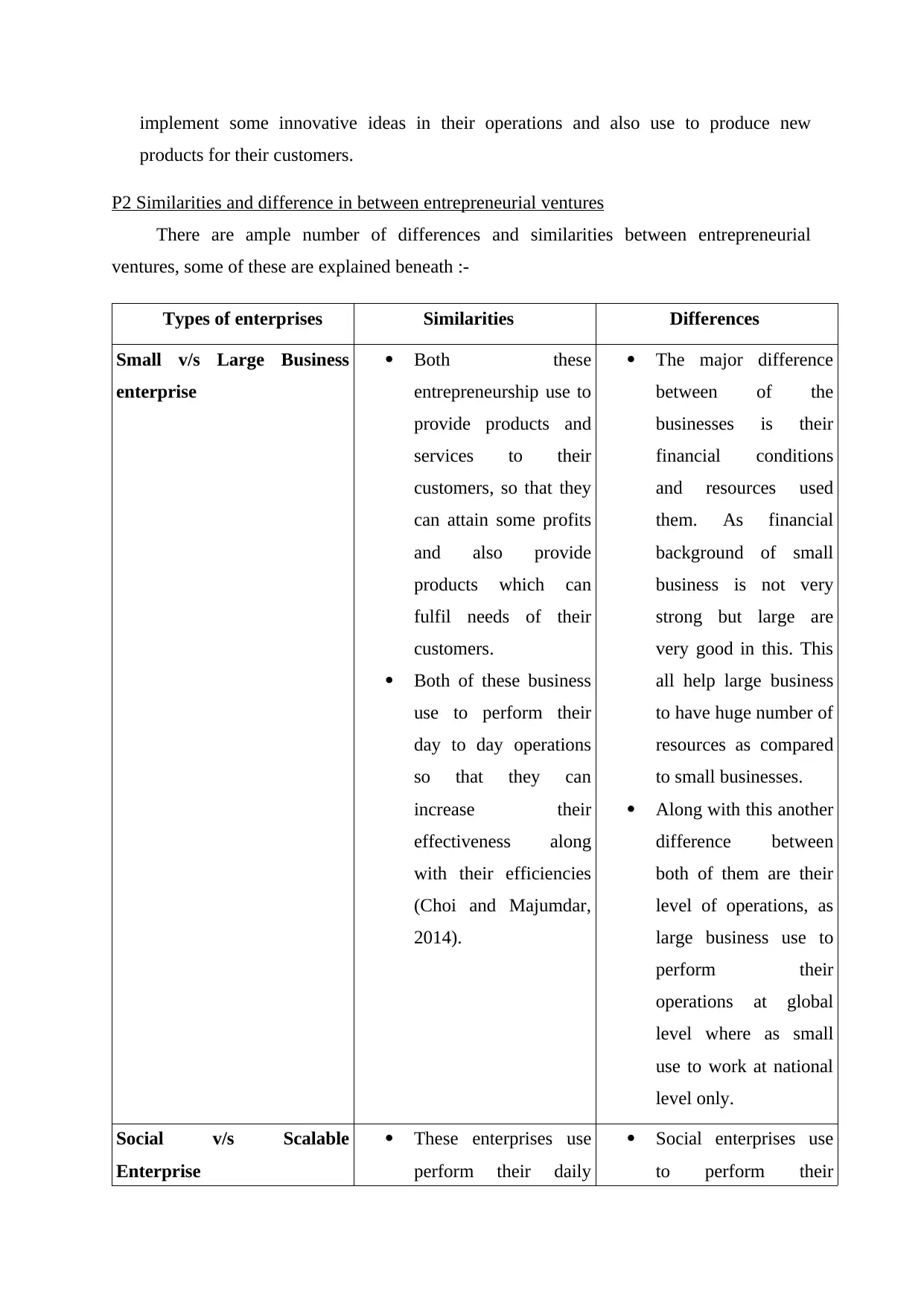
implement some innovative ideas in their operations and also use to produce new
products for their customers.
P2 Similarities and difference in between entrepreneurial ventures
There are ample number of differences and similarities between entrepreneurial
ventures, some of these are explained beneath :-
Types of enterprises Similarities Differences
Small v/s Large Business
enterprise
Both these
entrepreneurship use to
provide products and
services to their
customers, so that they
can attain some profits
and also provide
products which can
fulfil needs of their
customers.
Both of these business
use to perform their
day to day operations
so that they can
increase their
effectiveness along
with their efficiencies
(Choi and Majumdar,
2014).
The major difference
between of the
businesses is their
financial conditions
and resources used
them. As financial
background of small
business is not very
strong but large are
very good in this. This
all help large business
to have huge number of
resources as compared
to small businesses.
Along with this another
difference between
both of them are their
level of operations, as
large business use to
perform their
operations at global
level where as small
use to work at national
level only.
Social v/s Scalable
Enterprise
These enterprises use
perform their daily
Social enterprises use
to perform their
products for their customers.
P2 Similarities and difference in between entrepreneurial ventures
There are ample number of differences and similarities between entrepreneurial
ventures, some of these are explained beneath :-
Types of enterprises Similarities Differences
Small v/s Large Business
enterprise
Both these
entrepreneurship use to
provide products and
services to their
customers, so that they
can attain some profits
and also provide
products which can
fulfil needs of their
customers.
Both of these business
use to perform their
day to day operations
so that they can
increase their
effectiveness along
with their efficiencies
(Choi and Majumdar,
2014).
The major difference
between of the
businesses is their
financial conditions
and resources used
them. As financial
background of small
business is not very
strong but large are
very good in this. This
all help large business
to have huge number of
resources as compared
to small businesses.
Along with this another
difference between
both of them are their
level of operations, as
large business use to
perform their
operations at global
level where as small
use to work at national
level only.
Social v/s Scalable
Enterprise
These enterprises use
perform their daily
Social enterprises use
to perform their
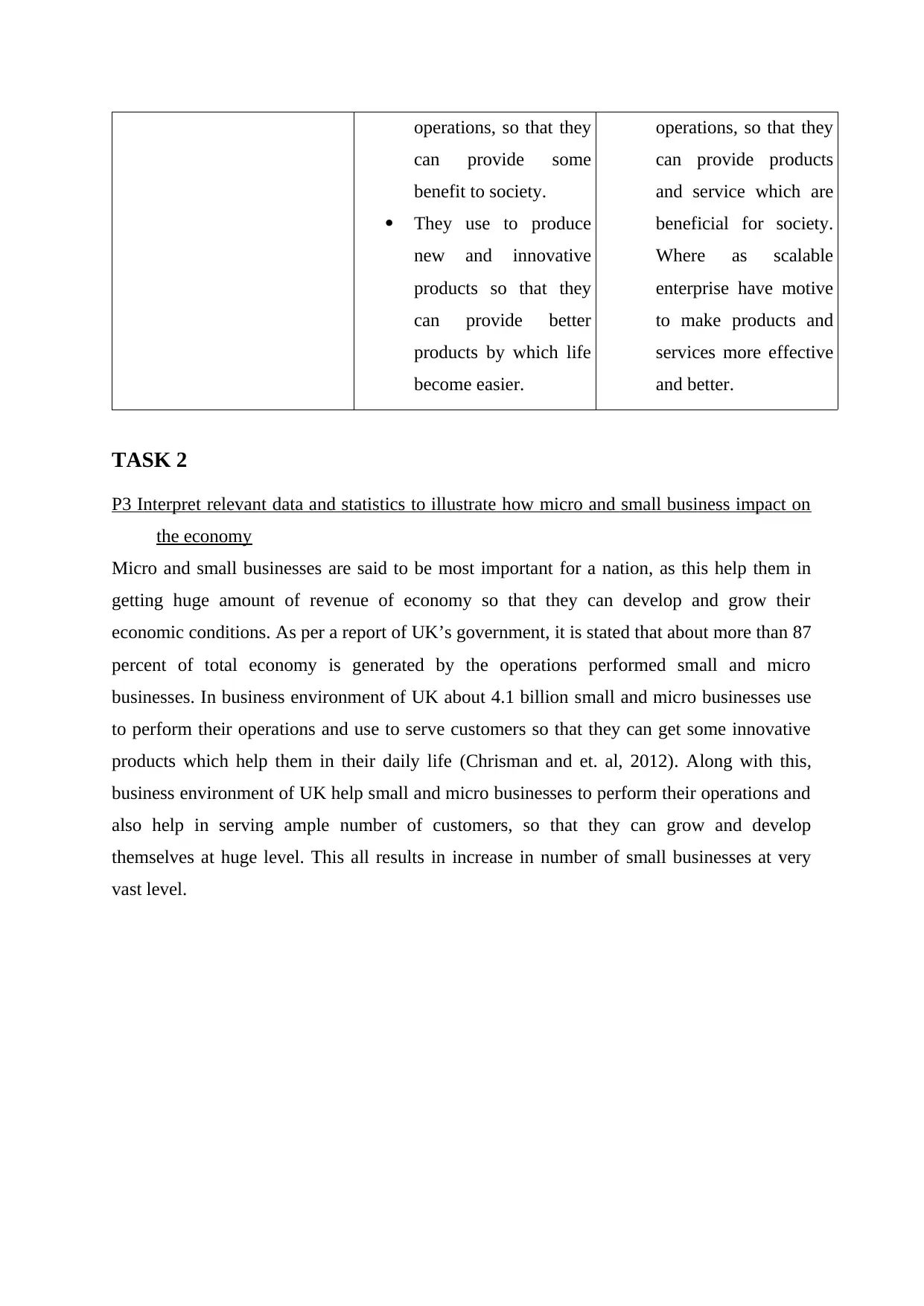
operations, so that they
can provide some
benefit to society.
They use to produce
new and innovative
products so that they
can provide better
products by which life
become easier.
operations, so that they
can provide products
and service which are
beneficial for society.
Where as scalable
enterprise have motive
to make products and
services more effective
and better.
TASK 2
P3 Interpret relevant data and statistics to illustrate how micro and small business impact on
the economy
Micro and small businesses are said to be most important for a nation, as this help them in
getting huge amount of revenue of economy so that they can develop and grow their
economic conditions. As per a report of UK’s government, it is stated that about more than 87
percent of total economy is generated by the operations performed small and micro
businesses. In business environment of UK about 4.1 billion small and micro businesses use
to perform their operations and use to serve customers so that they can get some innovative
products which help them in their daily life (Chrisman and et. al, 2012). Along with this,
business environment of UK help small and micro businesses to perform their operations and
also help in serving ample number of customers, so that they can grow and develop
themselves at huge level. This all results in increase in number of small businesses at very
vast level.
can provide some
benefit to society.
They use to produce
new and innovative
products so that they
can provide better
products by which life
become easier.
operations, so that they
can provide products
and service which are
beneficial for society.
Where as scalable
enterprise have motive
to make products and
services more effective
and better.
TASK 2
P3 Interpret relevant data and statistics to illustrate how micro and small business impact on
the economy
Micro and small businesses are said to be most important for a nation, as this help them in
getting huge amount of revenue of economy so that they can develop and grow their
economic conditions. As per a report of UK’s government, it is stated that about more than 87
percent of total economy is generated by the operations performed small and micro
businesses. In business environment of UK about 4.1 billion small and micro businesses use
to perform their operations and use to serve customers so that they can get some innovative
products which help them in their daily life (Chrisman and et. al, 2012). Along with this,
business environment of UK help small and micro businesses to perform their operations and
also help in serving ample number of customers, so that they can grow and develop
themselves at huge level. This all results in increase in number of small businesses at very
vast level.
⊘ This is a preview!⊘
Do you want full access?
Subscribe today to unlock all pages.

Trusted by 1+ million students worldwide
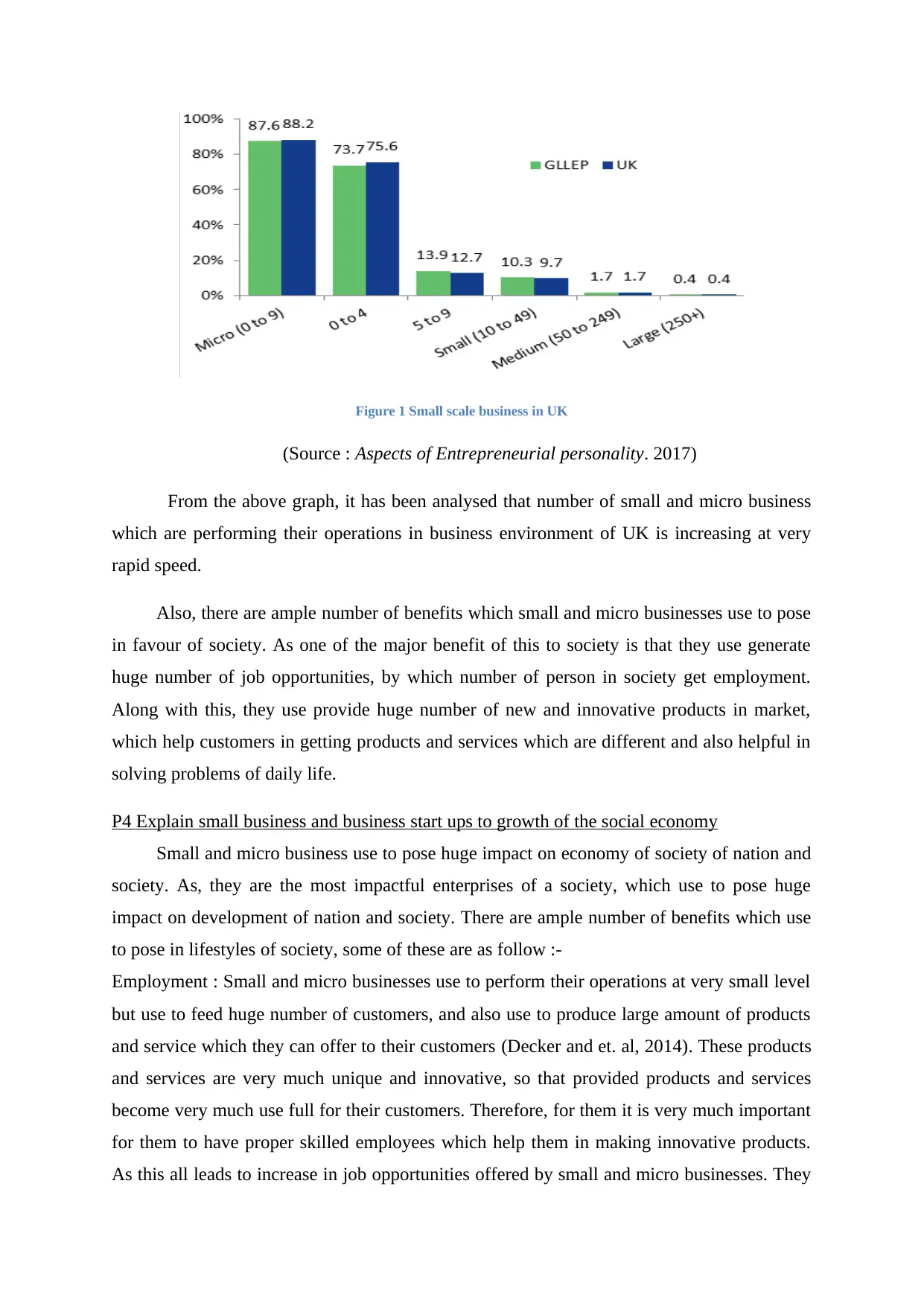
Figure 1 Small scale business in UK
(Source : Aspects of Entrepreneurial personality. 2017)
From the above graph, it has been analysed that number of small and micro business
which are performing their operations in business environment of UK is increasing at very
rapid speed.
Also, there are ample number of benefits which small and micro businesses use to pose
in favour of society. As one of the major benefit of this to society is that they use generate
huge number of job opportunities, by which number of person in society get employment.
Along with this, they use provide huge number of new and innovative products in market,
which help customers in getting products and services which are different and also helpful in
solving problems of daily life.
P4 Explain small business and business start ups to growth of the social economy
Small and micro business use to pose huge impact on economy of society of nation and
society. As, they are the most impactful enterprises of a society, which use to pose huge
impact on development of nation and society. There are ample number of benefits which use
to pose in lifestyles of society, some of these are as follow :-
Employment : Small and micro businesses use to perform their operations at very small level
but use to feed huge number of customers, and also use to produce large amount of products
and service which they can offer to their customers (Decker and et. al, 2014). These products
and services are very much unique and innovative, so that provided products and services
become very much use full for their customers. Therefore, for them it is very much important
for them to have proper skilled employees which help them in making innovative products.
As this all leads to increase in job opportunities offered by small and micro businesses. They
(Source : Aspects of Entrepreneurial personality. 2017)
From the above graph, it has been analysed that number of small and micro business
which are performing their operations in business environment of UK is increasing at very
rapid speed.
Also, there are ample number of benefits which small and micro businesses use to pose
in favour of society. As one of the major benefit of this to society is that they use generate
huge number of job opportunities, by which number of person in society get employment.
Along with this, they use provide huge number of new and innovative products in market,
which help customers in getting products and services which are different and also helpful in
solving problems of daily life.
P4 Explain small business and business start ups to growth of the social economy
Small and micro business use to pose huge impact on economy of society of nation and
society. As, they are the most impactful enterprises of a society, which use to pose huge
impact on development of nation and society. There are ample number of benefits which use
to pose in lifestyles of society, some of these are as follow :-
Employment : Small and micro businesses use to perform their operations at very small level
but use to feed huge number of customers, and also use to produce large amount of products
and service which they can offer to their customers (Decker and et. al, 2014). These products
and services are very much unique and innovative, so that provided products and services
become very much use full for their customers. Therefore, for them it is very much important
for them to have proper skilled employees which help them in making innovative products.
As this all leads to increase in job opportunities offered by small and micro businesses. They
Paraphrase This Document
Need a fresh take? Get an instant paraphrase of this document with our AI Paraphraser
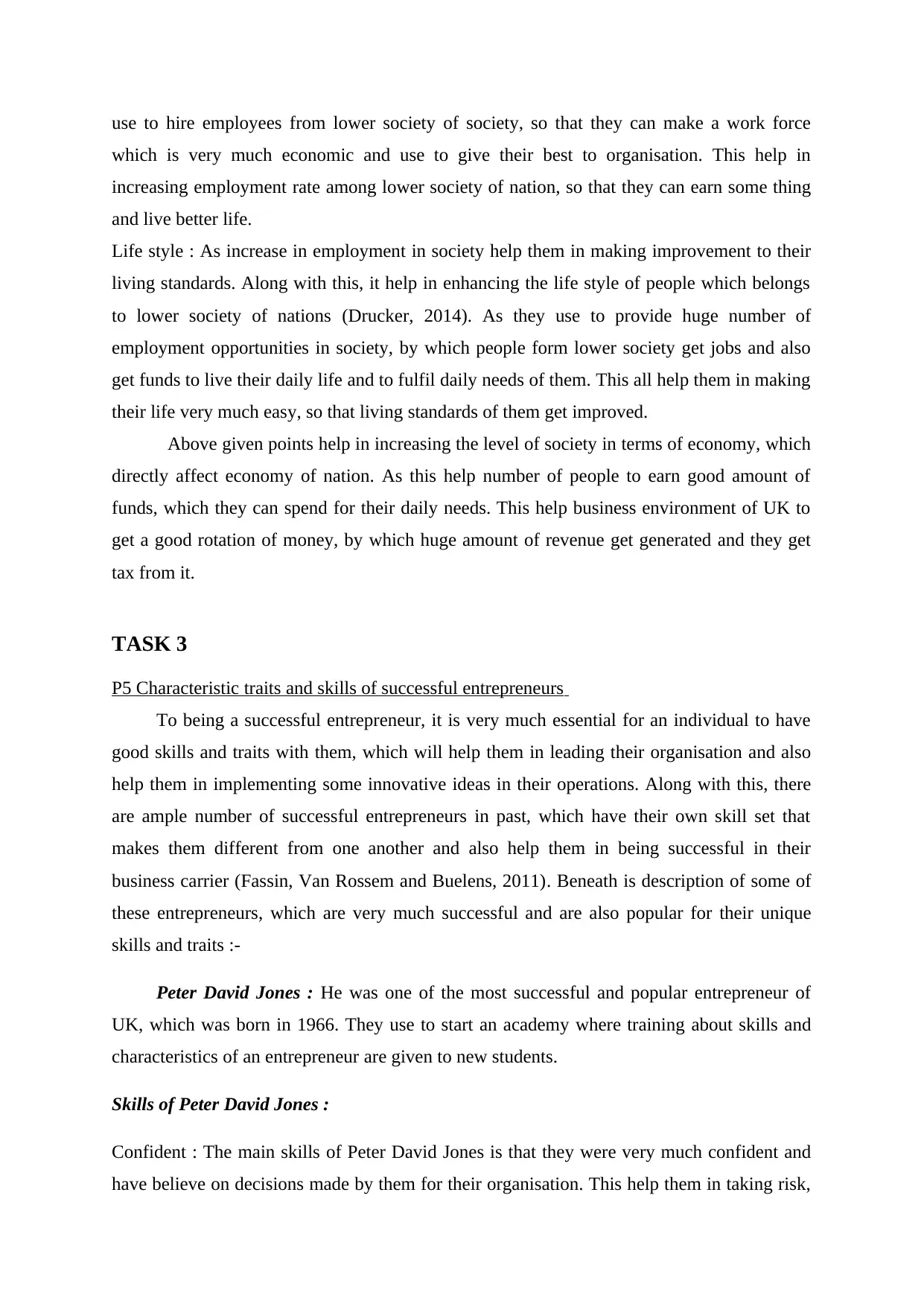
use to hire employees from lower society of society, so that they can make a work force
which is very much economic and use to give their best to organisation. This help in
increasing employment rate among lower society of nation, so that they can earn some thing
and live better life.
Life style : As increase in employment in society help them in making improvement to their
living standards. Along with this, it help in enhancing the life style of people which belongs
to lower society of nations (Drucker, 2014). As they use to provide huge number of
employment opportunities in society, by which people form lower society get jobs and also
get funds to live their daily life and to fulfil daily needs of them. This all help them in making
their life very much easy, so that living standards of them get improved.
Above given points help in increasing the level of society in terms of economy, which
directly affect economy of nation. As this help number of people to earn good amount of
funds, which they can spend for their daily needs. This help business environment of UK to
get a good rotation of money, by which huge amount of revenue get generated and they get
tax from it.
TASK 3
P5 Characteristic traits and skills of successful entrepreneurs
To being a successful entrepreneur, it is very much essential for an individual to have
good skills and traits with them, which will help them in leading their organisation and also
help them in implementing some innovative ideas in their operations. Along with this, there
are ample number of successful entrepreneurs in past, which have their own skill set that
makes them different from one another and also help them in being successful in their
business carrier (Fassin, Van Rossem and Buelens, 2011). Beneath is description of some of
these entrepreneurs, which are very much successful and are also popular for their unique
skills and traits :-
Peter David Jones : He was one of the most successful and popular entrepreneur of
UK, which was born in 1966. They use to start an academy where training about skills and
characteristics of an entrepreneur are given to new students.
Skills of Peter David Jones :
Confident : The main skills of Peter David Jones is that they were very much confident and
have believe on decisions made by them for their organisation. This help them in taking risk,
which is very much economic and use to give their best to organisation. This help in
increasing employment rate among lower society of nation, so that they can earn some thing
and live better life.
Life style : As increase in employment in society help them in making improvement to their
living standards. Along with this, it help in enhancing the life style of people which belongs
to lower society of nations (Drucker, 2014). As they use to provide huge number of
employment opportunities in society, by which people form lower society get jobs and also
get funds to live their daily life and to fulfil daily needs of them. This all help them in making
their life very much easy, so that living standards of them get improved.
Above given points help in increasing the level of society in terms of economy, which
directly affect economy of nation. As this help number of people to earn good amount of
funds, which they can spend for their daily needs. This help business environment of UK to
get a good rotation of money, by which huge amount of revenue get generated and they get
tax from it.
TASK 3
P5 Characteristic traits and skills of successful entrepreneurs
To being a successful entrepreneur, it is very much essential for an individual to have
good skills and traits with them, which will help them in leading their organisation and also
help them in implementing some innovative ideas in their operations. Along with this, there
are ample number of successful entrepreneurs in past, which have their own skill set that
makes them different from one another and also help them in being successful in their
business carrier (Fassin, Van Rossem and Buelens, 2011). Beneath is description of some of
these entrepreneurs, which are very much successful and are also popular for their unique
skills and traits :-
Peter David Jones : He was one of the most successful and popular entrepreneur of
UK, which was born in 1966. They use to start an academy where training about skills and
characteristics of an entrepreneur are given to new students.
Skills of Peter David Jones :
Confident : The main skills of Peter David Jones is that they were very much confident and
have believe on decisions made by them for their organisation. This help them in taking risk,
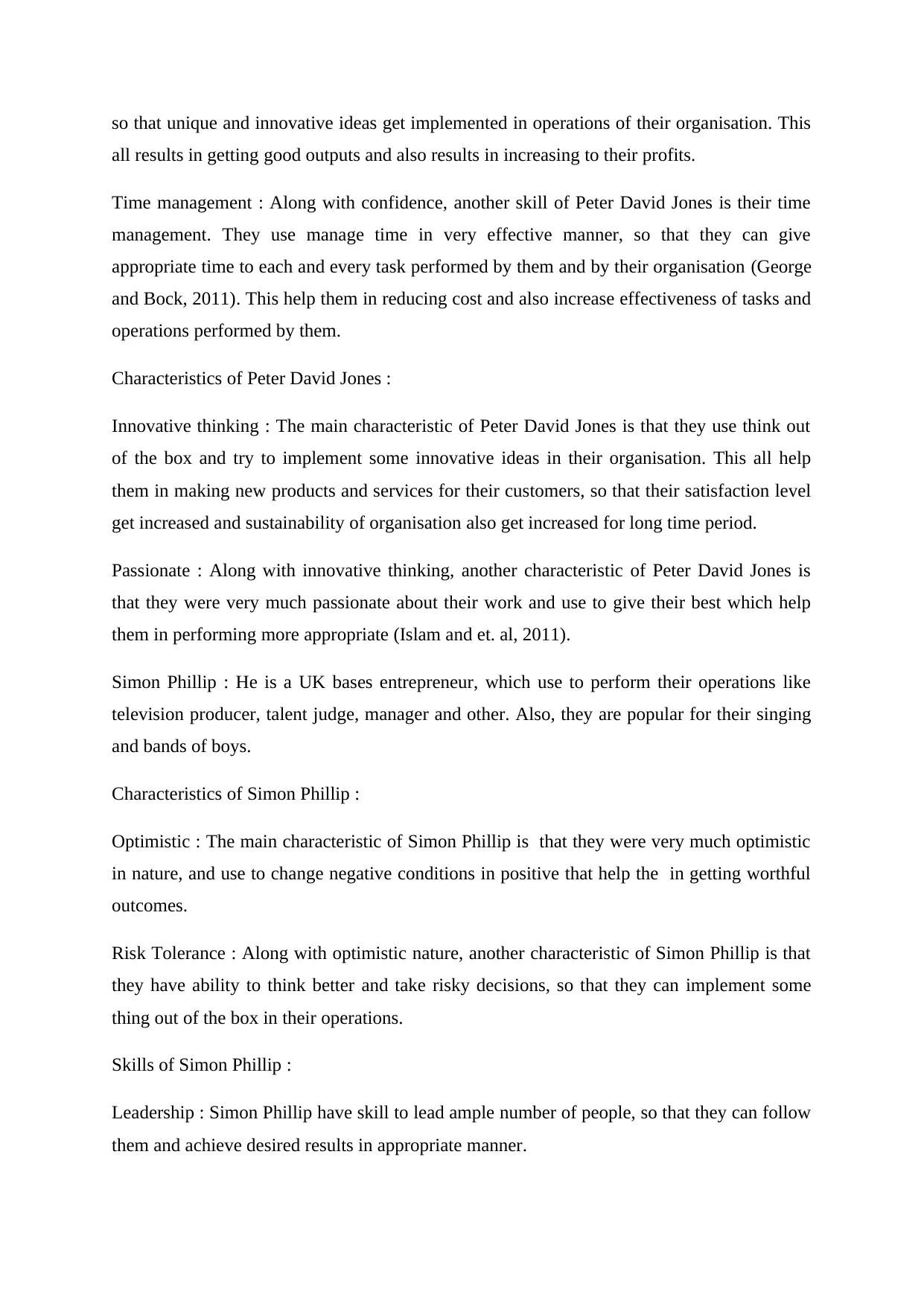
so that unique and innovative ideas get implemented in operations of their organisation. This
all results in getting good outputs and also results in increasing to their profits.
Time management : Along with confidence, another skill of Peter David Jones is their time
management. They use manage time in very effective manner, so that they can give
appropriate time to each and every task performed by them and by their organisation (George
and Bock, 2011). This help them in reducing cost and also increase effectiveness of tasks and
operations performed by them.
Characteristics of Peter David Jones :
Innovative thinking : The main characteristic of Peter David Jones is that they use think out
of the box and try to implement some innovative ideas in their organisation. This all help
them in making new products and services for their customers, so that their satisfaction level
get increased and sustainability of organisation also get increased for long time period.
Passionate : Along with innovative thinking, another characteristic of Peter David Jones is
that they were very much passionate about their work and use to give their best which help
them in performing more appropriate (Islam and et. al, 2011).
Simon Phillip : He is a UK bases entrepreneur, which use to perform their operations like
television producer, talent judge, manager and other. Also, they are popular for their singing
and bands of boys.
Characteristics of Simon Phillip :
Optimistic : The main characteristic of Simon Phillip is that they were very much optimistic
in nature, and use to change negative conditions in positive that help the in getting worthful
outcomes.
Risk Tolerance : Along with optimistic nature, another characteristic of Simon Phillip is that
they have ability to think better and take risky decisions, so that they can implement some
thing out of the box in their operations.
Skills of Simon Phillip :
Leadership : Simon Phillip have skill to lead ample number of people, so that they can follow
them and achieve desired results in appropriate manner.
all results in getting good outputs and also results in increasing to their profits.
Time management : Along with confidence, another skill of Peter David Jones is their time
management. They use manage time in very effective manner, so that they can give
appropriate time to each and every task performed by them and by their organisation (George
and Bock, 2011). This help them in reducing cost and also increase effectiveness of tasks and
operations performed by them.
Characteristics of Peter David Jones :
Innovative thinking : The main characteristic of Peter David Jones is that they use think out
of the box and try to implement some innovative ideas in their organisation. This all help
them in making new products and services for their customers, so that their satisfaction level
get increased and sustainability of organisation also get increased for long time period.
Passionate : Along with innovative thinking, another characteristic of Peter David Jones is
that they were very much passionate about their work and use to give their best which help
them in performing more appropriate (Islam and et. al, 2011).
Simon Phillip : He is a UK bases entrepreneur, which use to perform their operations like
television producer, talent judge, manager and other. Also, they are popular for their singing
and bands of boys.
Characteristics of Simon Phillip :
Optimistic : The main characteristic of Simon Phillip is that they were very much optimistic
in nature, and use to change negative conditions in positive that help the in getting worthful
outcomes.
Risk Tolerance : Along with optimistic nature, another characteristic of Simon Phillip is that
they have ability to think better and take risky decisions, so that they can implement some
thing out of the box in their operations.
Skills of Simon Phillip :
Leadership : Simon Phillip have skill to lead ample number of people, so that they can follow
them and achieve desired results in appropriate manner.
⊘ This is a preview!⊘
Do you want full access?
Subscribe today to unlock all pages.

Trusted by 1+ million students worldwide
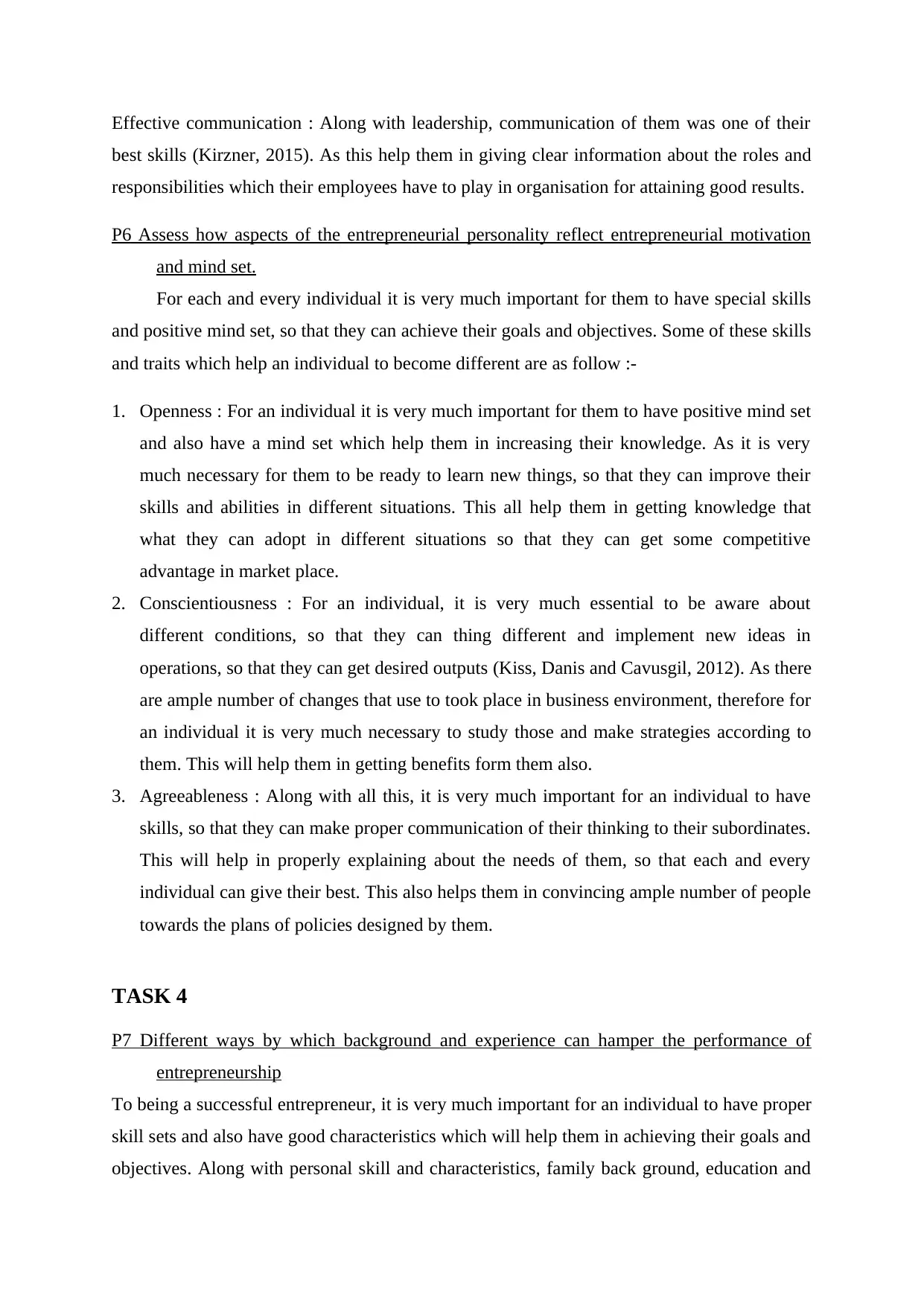
Effective communication : Along with leadership, communication of them was one of their
best skills (Kirzner, 2015). As this help them in giving clear information about the roles and
responsibilities which their employees have to play in organisation for attaining good results.
P6 Assess how aspects of the entrepreneurial personality reflect entrepreneurial motivation
and mind set.
For each and every individual it is very much important for them to have special skills
and positive mind set, so that they can achieve their goals and objectives. Some of these skills
and traits which help an individual to become different are as follow :-
1. Openness : For an individual it is very much important for them to have positive mind set
and also have a mind set which help them in increasing their knowledge. As it is very
much necessary for them to be ready to learn new things, so that they can improve their
skills and abilities in different situations. This all help them in getting knowledge that
what they can adopt in different situations so that they can get some competitive
advantage in market place.
2. Conscientiousness : For an individual, it is very much essential to be aware about
different conditions, so that they can thing different and implement new ideas in
operations, so that they can get desired outputs (Kiss, Danis and Cavusgil, 2012). As there
are ample number of changes that use to took place in business environment, therefore for
an individual it is very much necessary to study those and make strategies according to
them. This will help them in getting benefits form them also.
3. Agreeableness : Along with all this, it is very much important for an individual to have
skills, so that they can make proper communication of their thinking to their subordinates.
This will help in properly explaining about the needs of them, so that each and every
individual can give their best. This also helps them in convincing ample number of people
towards the plans of policies designed by them.
TASK 4
P7 Different ways by which background and experience can hamper the performance of
entrepreneurship
To being a successful entrepreneur, it is very much important for an individual to have proper
skill sets and also have good characteristics which will help them in achieving their goals and
objectives. Along with personal skill and characteristics, family back ground, education and
best skills (Kirzner, 2015). As this help them in giving clear information about the roles and
responsibilities which their employees have to play in organisation for attaining good results.
P6 Assess how aspects of the entrepreneurial personality reflect entrepreneurial motivation
and mind set.
For each and every individual it is very much important for them to have special skills
and positive mind set, so that they can achieve their goals and objectives. Some of these skills
and traits which help an individual to become different are as follow :-
1. Openness : For an individual it is very much important for them to have positive mind set
and also have a mind set which help them in increasing their knowledge. As it is very
much necessary for them to be ready to learn new things, so that they can improve their
skills and abilities in different situations. This all help them in getting knowledge that
what they can adopt in different situations so that they can get some competitive
advantage in market place.
2. Conscientiousness : For an individual, it is very much essential to be aware about
different conditions, so that they can thing different and implement new ideas in
operations, so that they can get desired outputs (Kiss, Danis and Cavusgil, 2012). As there
are ample number of changes that use to took place in business environment, therefore for
an individual it is very much necessary to study those and make strategies according to
them. This will help them in getting benefits form them also.
3. Agreeableness : Along with all this, it is very much important for an individual to have
skills, so that they can make proper communication of their thinking to their subordinates.
This will help in properly explaining about the needs of them, so that each and every
individual can give their best. This also helps them in convincing ample number of people
towards the plans of policies designed by them.
TASK 4
P7 Different ways by which background and experience can hamper the performance of
entrepreneurship
To being a successful entrepreneur, it is very much important for an individual to have proper
skill sets and also have good characteristics which will help them in achieving their goals and
objectives. Along with personal skill and characteristics, family back ground, education and
Paraphrase This Document
Need a fresh take? Get an instant paraphrase of this document with our AI Paraphraser
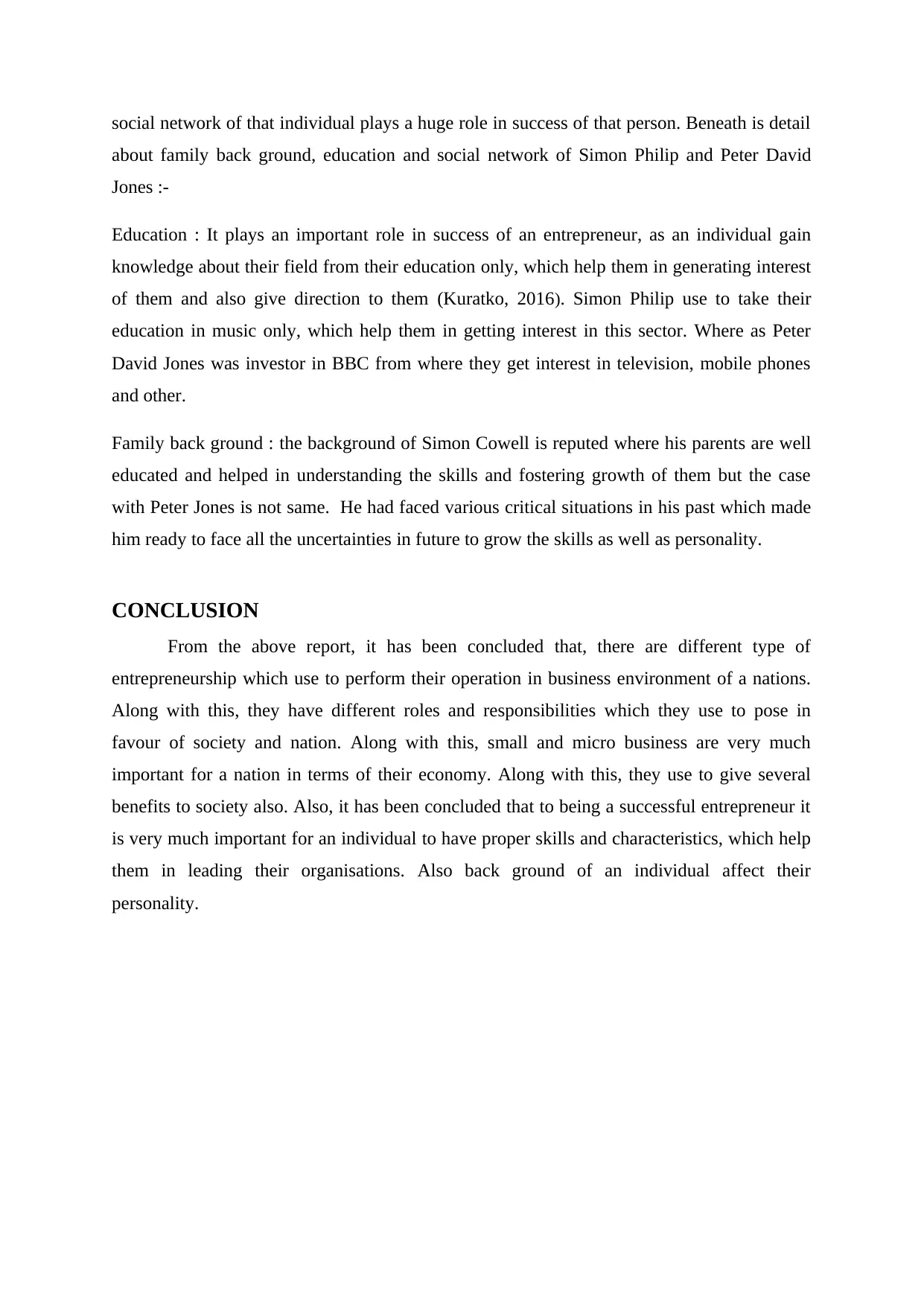
social network of that individual plays a huge role in success of that person. Beneath is detail
about family back ground, education and social network of Simon Philip and Peter David
Jones :-
Education : It plays an important role in success of an entrepreneur, as an individual gain
knowledge about their field from their education only, which help them in generating interest
of them and also give direction to them (Kuratko, 2016). Simon Philip use to take their
education in music only, which help them in getting interest in this sector. Where as Peter
David Jones was investor in BBC from where they get interest in television, mobile phones
and other.
Family back ground : the background of Simon Cowell is reputed where his parents are well
educated and helped in understanding the skills and fostering growth of them but the case
with Peter Jones is not same. He had faced various critical situations in his past which made
him ready to face all the uncertainties in future to grow the skills as well as personality.
CONCLUSION
From the above report, it has been concluded that, there are different type of
entrepreneurship which use to perform their operation in business environment of a nations.
Along with this, they have different roles and responsibilities which they use to pose in
favour of society and nation. Along with this, small and micro business are very much
important for a nation in terms of their economy. Along with this, they use to give several
benefits to society also. Also, it has been concluded that to being a successful entrepreneur it
is very much important for an individual to have proper skills and characteristics, which help
them in leading their organisations. Also back ground of an individual affect their
personality.
about family back ground, education and social network of Simon Philip and Peter David
Jones :-
Education : It plays an important role in success of an entrepreneur, as an individual gain
knowledge about their field from their education only, which help them in generating interest
of them and also give direction to them (Kuratko, 2016). Simon Philip use to take their
education in music only, which help them in getting interest in this sector. Where as Peter
David Jones was investor in BBC from where they get interest in television, mobile phones
and other.
Family back ground : the background of Simon Cowell is reputed where his parents are well
educated and helped in understanding the skills and fostering growth of them but the case
with Peter Jones is not same. He had faced various critical situations in his past which made
him ready to face all the uncertainties in future to grow the skills as well as personality.
CONCLUSION
From the above report, it has been concluded that, there are different type of
entrepreneurship which use to perform their operation in business environment of a nations.
Along with this, they have different roles and responsibilities which they use to pose in
favour of society and nation. Along with this, small and micro business are very much
important for a nation in terms of their economy. Along with this, they use to give several
benefits to society also. Also, it has been concluded that to being a successful entrepreneur it
is very much important for an individual to have proper skills and characteristics, which help
them in leading their organisations. Also back ground of an individual affect their
personality.
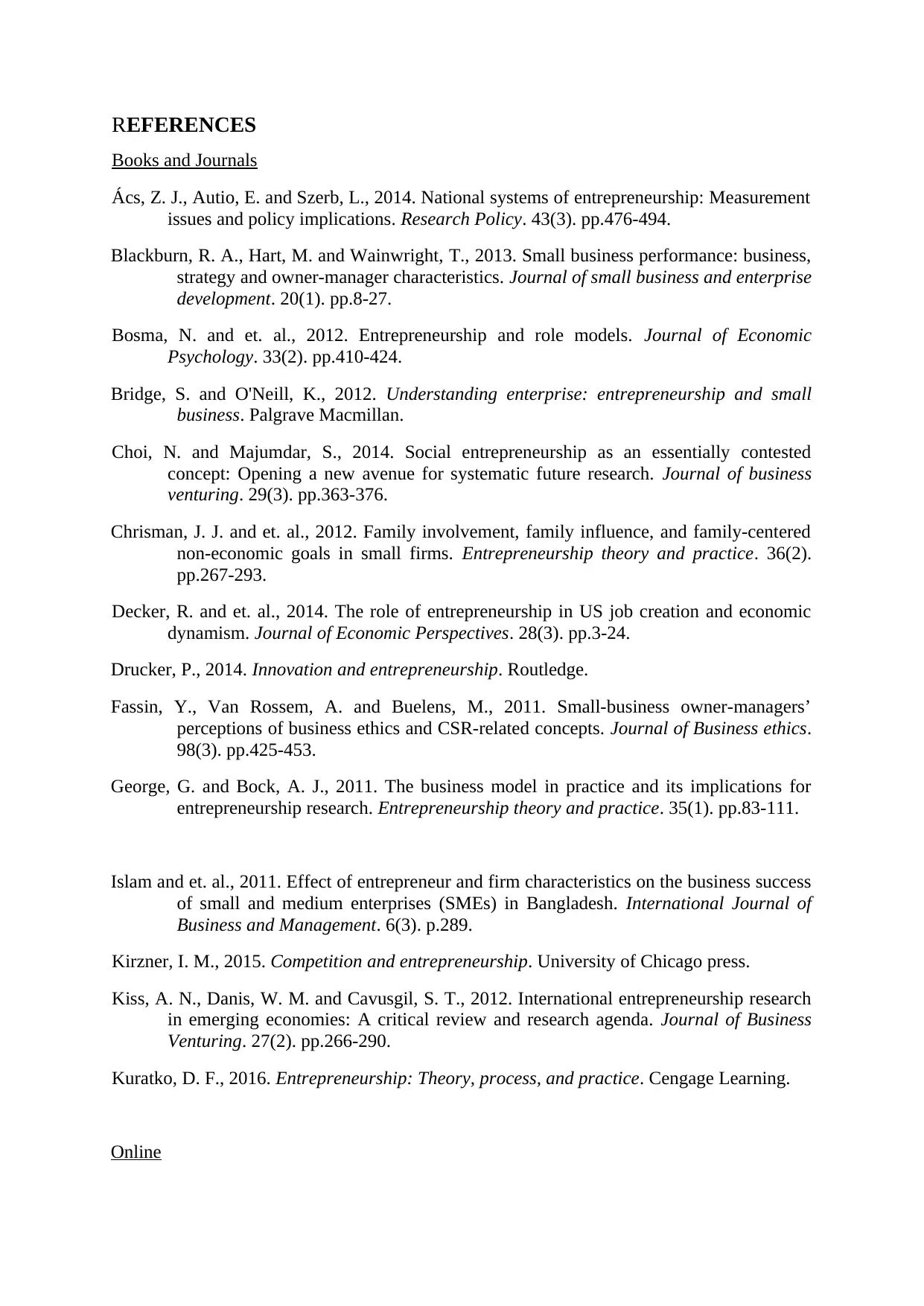
REFERENCES
Books and Journals
Ács, Z. J., Autio, E. and Szerb, L., 2014. National systems of entrepreneurship: Measurement
issues and policy implications. Research Policy. 43(3). pp.476-494.
Blackburn, R. A., Hart, M. and Wainwright, T., 2013. Small business performance: business,
strategy and owner-manager characteristics. Journal of small business and enterprise
development. 20(1). pp.8-27.
Bosma, N. and et. al., 2012. Entrepreneurship and role models. Journal of Economic
Psychology. 33(2). pp.410-424.
Bridge, S. and O'Neill, K., 2012. Understanding enterprise: entrepreneurship and small
business. Palgrave Macmillan.
Choi, N. and Majumdar, S., 2014. Social entrepreneurship as an essentially contested
concept: Opening a new avenue for systematic future research. Journal of business
venturing. 29(3). pp.363-376.
Chrisman, J. J. and et. al., 2012. Family involvement, family influence, and family‐centered
non‐economic goals in small firms. Entrepreneurship theory and practice. 36(2).
pp.267-293.
Decker, R. and et. al., 2014. The role of entrepreneurship in US job creation and economic
dynamism. Journal of Economic Perspectives. 28(3). pp.3-24.
Drucker, P., 2014. Innovation and entrepreneurship. Routledge.
Fassin, Y., Van Rossem, A. and Buelens, M., 2011. Small-business owner-managers’
perceptions of business ethics and CSR-related concepts. Journal of Business ethics.
98(3). pp.425-453.
George, G. and Bock, A. J., 2011. The business model in practice and its implications for
entrepreneurship research. Entrepreneurship theory and practice. 35(1). pp.83-111.
Islam and et. al., 2011. Effect of entrepreneur and firm characteristics on the business success
of small and medium enterprises (SMEs) in Bangladesh. International Journal of
Business and Management. 6(3). p.289.
Kirzner, I. M., 2015. Competition and entrepreneurship. University of Chicago press.
Kiss, A. N., Danis, W. M. and Cavusgil, S. T., 2012. International entrepreneurship research
in emerging economies: A critical review and research agenda. Journal of Business
Venturing. 27(2). pp.266-290.
Kuratko, D. F., 2016. Entrepreneurship: Theory, process, and practice. Cengage Learning.
Online
Books and Journals
Ács, Z. J., Autio, E. and Szerb, L., 2014. National systems of entrepreneurship: Measurement
issues and policy implications. Research Policy. 43(3). pp.476-494.
Blackburn, R. A., Hart, M. and Wainwright, T., 2013. Small business performance: business,
strategy and owner-manager characteristics. Journal of small business and enterprise
development. 20(1). pp.8-27.
Bosma, N. and et. al., 2012. Entrepreneurship and role models. Journal of Economic
Psychology. 33(2). pp.410-424.
Bridge, S. and O'Neill, K., 2012. Understanding enterprise: entrepreneurship and small
business. Palgrave Macmillan.
Choi, N. and Majumdar, S., 2014. Social entrepreneurship as an essentially contested
concept: Opening a new avenue for systematic future research. Journal of business
venturing. 29(3). pp.363-376.
Chrisman, J. J. and et. al., 2012. Family involvement, family influence, and family‐centered
non‐economic goals in small firms. Entrepreneurship theory and practice. 36(2).
pp.267-293.
Decker, R. and et. al., 2014. The role of entrepreneurship in US job creation and economic
dynamism. Journal of Economic Perspectives. 28(3). pp.3-24.
Drucker, P., 2014. Innovation and entrepreneurship. Routledge.
Fassin, Y., Van Rossem, A. and Buelens, M., 2011. Small-business owner-managers’
perceptions of business ethics and CSR-related concepts. Journal of Business ethics.
98(3). pp.425-453.
George, G. and Bock, A. J., 2011. The business model in practice and its implications for
entrepreneurship research. Entrepreneurship theory and practice. 35(1). pp.83-111.
Islam and et. al., 2011. Effect of entrepreneur and firm characteristics on the business success
of small and medium enterprises (SMEs) in Bangladesh. International Journal of
Business and Management. 6(3). p.289.
Kirzner, I. M., 2015. Competition and entrepreneurship. University of Chicago press.
Kiss, A. N., Danis, W. M. and Cavusgil, S. T., 2012. International entrepreneurship research
in emerging economies: A critical review and research agenda. Journal of Business
Venturing. 27(2). pp.266-290.
Kuratko, D. F., 2016. Entrepreneurship: Theory, process, and practice. Cengage Learning.
Online
⊘ This is a preview!⊘
Do you want full access?
Subscribe today to unlock all pages.

Trusted by 1+ million students worldwide
1 out of 13
Related Documents
Your All-in-One AI-Powered Toolkit for Academic Success.
+13062052269
info@desklib.com
Available 24*7 on WhatsApp / Email
![[object Object]](/_next/static/media/star-bottom.7253800d.svg)
Unlock your academic potential
Copyright © 2020–2026 A2Z Services. All Rights Reserved. Developed and managed by ZUCOL.





